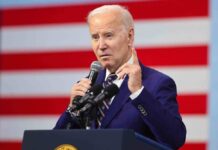
California is staring down at a huge financial issue, with state officials unveiling earlier this year that a huge budget deficit looms.
Many financial experts are concerned that California may not even be able to balance its budget if it doesn’t rely on short-term economic gimmicks.
In fiscal year 2024, California is expected to have a budget deficit of $73 billion. Part of that is due to a projected decline in tax revenue of $24 billion, as more and more people leave the state for greener pastures.
California also faces multiple roadblocks to cutting some expenses, including likely opposition for unions. Still, there may be some “tricks” that the state could use to its advantage.
Speaking with the Daily Caller News Foundation this week, John Moorlach, a former state senator in California who works now as the director of the California Policy Center’s Center for Public Accountability, said:
“The state can use a variety of budget tricks. Workarounds include timing of expenditures and similar techniques. Financing is not possible without voter approval.
“But, internal borrowing is in the bag of tricks. I believe it was Governor Davis who borrowed against the tobacco settlement funding stream to balance one of his annual budgets. But, I don’t believe securitizing an existing revenue stream required voter approval.”
Every year, the governor has to submit a budget by January 10, according to the state’s constitution. If that budget shows a deficit, the governor then must submit further plans to either cut expenses or acquire funding.
The final budget has to be passed by June 15 every year.
During a speech he gave in January about the budget and economy in California, Democratic Governor Gavin Newsom said:
“California is the tent pole of the American economy — in terms of American recovery — in terms of job creation, innovation, entrepreneurial spirit. I dismiss, with respect, that narrative. That’s just folks painting a picture and coloring it in because they’re focusing on one side of the ledger. I just couldn’t be more proud of the resiliency of this state.”
In early April, the state Legislature and Newsome released details of an agreement that will show some budget cuts that will total roughly $17.3 billion. More cuts are expected to come as well.
Wayne Winegarden, who works for the Pacific Research Institute as a senior fellow in business and economics, commented on those cuts to the DCNF:
“Under their approach, just 21% of the $17.3 billion in solutions in the plan that is expected to be voted on this week are actual cuts — $3.6 billion. The rest of the plan simply kicks the can down the road through fund shifts, borrowing, delays and deferrals.”
The state has some huge line items on the expenditure side, such as spending nearly $24 million to combat homelessness in the last five years. It has also spent about $9.8 billion on plans to potentially build a high-speed rail system that will connect major cities in the state.
The total cost of that projected is projected at anywhere from $88 billion to $128 billion.













